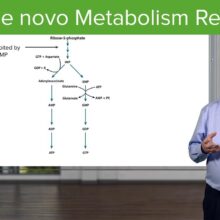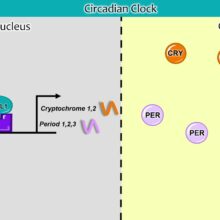Robert Tjian (Berkeley/HHMI) Part 1: Gene regulation: An introduction
Transcription, the conversion of DNA to RNA, is one of the most fundamental processes in cell biology. However, only about 3% of our total DNA encodes genes to be transcribed. RNA polymerase II, the enzyme that transcribes DNA to RNA, relies on a large set of proteins known as transcription factors to recognize the coding sequences and to transcribe the correct genes, in the correct cell type, at the correct time. In Part 1 of his lecture, Tjian gives an overview of the complex and critical role that transcription factors play in regulating gene expression.
How do different cells from the same organism, such as muscle cells, neurons and red blood cells, all of which have identical DNA, have such different phenotypes? Tjian addresses this question in his second lecture, where he expands on the mechanisms of gene regulation.
[ad_2]
Source link





Very clear and informative! Thanks for helping me with my molecular biology course lol.
So… 97% of the genome, once thought to be useless material left over from our evolutionary past, is now know to be more functional than the 3% that codes for proteins. How do you suppose all that INFORMATION got there? Something to think about…..
This is one of the best iBiology lectures ever.
Sometimes, it is so hard to imagine how accumulating a bunch of proteins "on the promoter" can help RNA polymerase start transcription at the gene coding sequence. But he shows all the steps using models, reminding us that all the steps are happening in 3D space and not linear DNA. Thanks for this. Amazing stuff!
Lol and they say there is no god wow
This is so……Awesome. I want to know more about this!!
Thanks a lot for a very informative but easy-to-understand lecture!
wow
Love ibiology.
who wants to play some among us?
an excellent presentation. thank you so much.
Awesome!!!
Excellent lecture, thank you very much for producing it for us!
This video is related in part to the theoretical work of Richard Dawkins? Genes are the fundamental unit of evolution. It would be good to make a conference where to explain the work of William Donald Hamilton and Richard Dawkins and the impact of the gene centred view of evolution.
Thank you
Go bears!
Thanks IBiology You are my HERO <3
thanks for subs!
and motifs?
Excellent lecture! You are a very good teacher. Thank you!
Than you Professor Tjian. Particularly, I enjoyed watching the carton about transcription.
Prof. Tjian thanks for this great material. It seems that the type of promoter also matters for binding of a certain transcription factor (or of a set of transcription factors). There are several new studies with respect to the types of eukaryotic promoters
(http://www.biomedcentral.com/1471-2164/13/512). There is a specific class of promoters (called CG-based class) that stand out (have a higher frequency in the genome) and seem to be specific to mammals (and generally to more advanced eukaryotes).
Very informative, thank you going to tell my friends so they so can pass and be informed about genes! 🙂
I read stacks of Robert Tjian's papers from the early 1980s when researching the promoter region my favorite gene for my PhD. He's not exaggerating when he says that gene transcription is complex and that we still don't fully understand…well I certainly don't. What a pleasant surprise to find these informative videos with a man whose work I greatly admire.